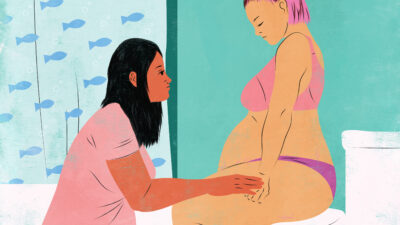About two decades ago, Tica Nickson of Erie connected with a friend from elementary school who was pregnant, and she mentioned that she was using a doula during her pregnancy.
“What is that?” replied Nickson, who later watched a documentary to learn about doulas.
Like many people, Nickson had never heard of a doula, a pregnancy support professional that is becoming increasingly popular nationwide. Women have been supporting each other during pregnancy for centuries, but the term doula only emerged in the 1960s.
A doula provides emotional and physical support to women from the beginning of pregnancy to a few months after birth.
Some 20 years after that first conversation, Nickson not only became a doula, but she now is director of prevention at BirthRoot Community Doula Alliance in northwestern Pennsylvania. This Erie-based organization offers doula services targeted mostly for at-risk mothers in vulnerable communities, such as women of color.
Black women have the highest maternal mortality rates among all pregnant women in the United States, according to the Centers for Disease Control and Prevention. Part of this could be because of the weathering hypothesis, Nickson said. This states that chronic exposure to social and economic disadvantage leads to accelerated decline in physical health outcomes, and this could partially explain racial disparities in some health conditions.
In Erie County, the rating of the Maternal Vulnerability Index is in the moderate range, but that doesn’t account for the effect of stress, mental illness, and substance abuse on maternal well-being, Nickson said. Doulas help by giving mothers a constant source of nurturing support throughout the whole pregnancy process and beyond, Nickson said. The doulas make sure mothers are more able to effectively navigate resources through “warm hand offs,” rather than just giving them a phone number to call.
Thanks to grants, BirthRoot — which works under the umbrella of nonprofit Emma’s Footprints, which provides support for women who lose their pregnancies or infants — provides free doula care to anyone in Erie County.
“When I was having babies, doulas were for rich white ladies,” Nickson said. “Now, it’s come full circle.”
BirthRoot — which is in the process of becoming its own organization — also trains and commissions the Black and brown community in providing doula care; their office opened on Dec. 15, 2021.
Medicaid programs in more than half the states in the US cover doula care, though Pennsylvania is not one of them. Some private insurers also cover doula services.
In Erie County, the need for no-cost doula services is great. In the county, 15.8% of the population lives below the poverty line, according to the U.S. Census Bureau. This is higher than the national poverty rate of 11.5%. The median income is about $30,000, and one of the City of Erie’s ZIP codes is among the poorest in the country, Nickson said.
“What we have found is that the representation of our doulas is imperative to our mothers having positive, less traumatic birth experiences. Having a doula present is a remarkable, necessary part of that woman’s experience. I would like that to continue.” — Tica Nickson, director of prevention at BirthRoot Community Doula Alliance
Erie, a city located along the shore of Lake Erie, has food deserts, and a lot of refugees and immigrants adjusting to life in the US. All children attending Erie’s Public Schools are eligible for free breakfast and lunch, no matter their income level.
The reasons for Erie’s economic condition are complex, said Nickson, a lifelong Erie resident and mother of five. There are two public universities — Mercyhurst and Gannon in the area — but young adults tend to get their education in Erie, graduate, and then move elsewhere.
Over the past few decades, many factories left Erie, including International Paper and Hammermill Paper. Many jobs have disappeared. The lake effect can create especially heavy snow in the winter, which makes transportation and walking difficult, Nickson said. Economic challenges — and the fact that Medicaid doesn’t cover doulas in Pennsylvania — make free doula care a critical service for women, she said.
“We’re growing and we’re meeting the needs of our families and moms,” Nickson said. “We’re happy and blessed to be able to offer our services. We are really counting on our community and investors.
“What we have found is that the representation of our doulas is imperative to our mothers having positive, less traumatic birth experiences. Having a doula present is a remarkable, necessary part of that woman’s experience. I would like that to continue.”
Although some people may confuse doulas with midwives, the jobs are very different. Though not physicians, midwives are health care providers who can deliver babies and provide some gynecological care. Doulas play a role more like senior caregivers, with physical and emotional support services. Doulas meet with pregnant clients often to help them put together a birth plan, are present during the birth process, and stay involved during the first three months of the baby’s life.
Many doulas remain friends with their clients after the business relationship ends.
“Doulas don’t do anything medical in nature,” Nickson said. “We don’t take your blood pressure, and we don’t see if your cervix is dilated. … We make sure our moms know that.”
Doulas also provide educational support and point their clients to resources, like perineal massage and other techniques that can help to reduce stress during labor.
“We do a lot of resource navigation,” Nickson said. “Doctors don’t have time really in today’s medical field. They don’t really have time to do the patient education that a lot of women need.”
Doulas may become certified in Pennsylvania with 24 hours of education and work experience. They may get certified in specific areas like birth, postpartum care, and bereavement care to women who lose their babies.
“We cross-train all doulas so they are able to do all three,” Nickson said. “Some moms want to stick with the same doula.
Learn more about doulas and supporting pregnant people in marginalized communities on Episode 3 of the Good Health, Better World podcast.







